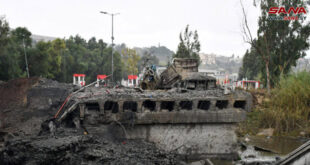Damascus, SANA-Modern archeological findings confirm that Syrians are one of the first ancient peoples to know copper metal as two cooper pieces were unearthed at the site of Tell Sabi Abyad in Raqqa, whose history dates back to the end of Pre-Pottery Neolithic (B) era.
From Syria, the process of developing the metallurgy in the world started, according to researcher and historian at the General Directorate of Antiquities and Museums, Dr. Mahmoud al-Sayyed.
Al-Sayyed said that in the archeological site of Ras Shamra at the Kingdom of Ugarit, an archeological ax which had been made with a unique technology and professionalism was unearthed.
He added that the ax, which is distinguished by its artistic value and elaborate decorations, is preserved at Aleppo Museum and it dates back to the era of modern bronze in the 14th century BC and represents one of the oldest evidence in the world of iron mining.
Al-Sayyed added that iron mining developed and its use spread in the first millennium BC in the ancient East, and the luxurious ax represented a weapon that embodies the first attempts to manufacture steel in the world and the first attempt in the history of the world to use three metals at the same time, namely copper, iron and gold in making a weapon or metal tool.
The ax’s blade was made of steel (iron) and carbon was added to it on the bottom of the blade and a copper collar or sheath was cast as a handle.
The collar was decorated with a protruding carving representing while some details showed the bodies of animals, as well as the floral decoration that accompanies them by inlaying them with golden threads.
At Ras ibn Hani site in Lattakia province, according to al-Sayyed, the first bronze alloy casting mold was unearthed.
The mold, which is preserved at Lattakia Museum, is made of a stone in the shape of a huge stone slab installed on the ground, and its surface is carved in the shape of the alloy.
At the site of Ras Shamra, the largest mold for casting metal tools was also discovered as it was dug into a limestone rock, carved on several sides, and used for casting axes, scissors and other metal tools. It is one of the very rare archeological findings in the world.
Bushra Dabin / Ruaa al-Jazaeri
 Syrian Arab News Agency S A N A
Syrian Arab News Agency S A N A

